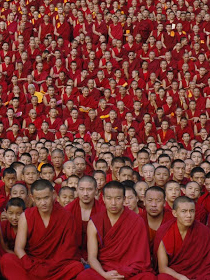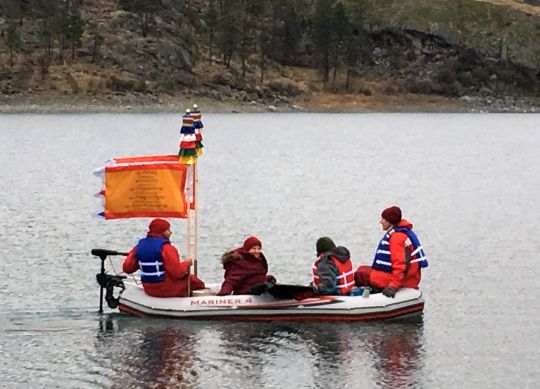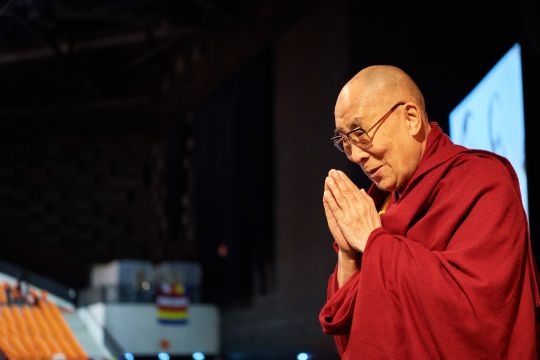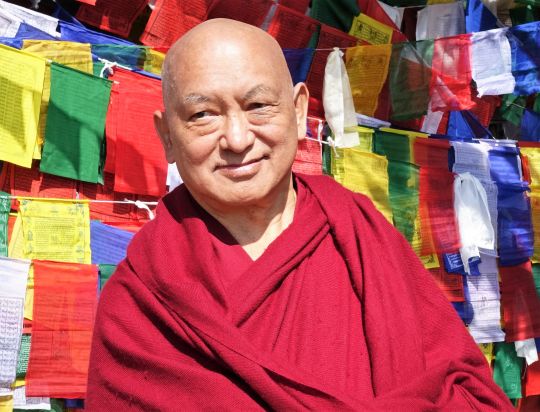- Home
- FPMT Homepage

Foundation for the Preservation of the Mahayana Tradition
The FPMT is an organization devoted to preserving and spreading Mahayana Buddhism worldwide by creating opportunities to listen, reflect, meditate, practice and actualize the unmistaken teachings of the Buddha and based on that experience spreading the Dharma to sentient beings. We provide integrated education through which people’s minds and hearts can be transformed into their highest potential for the benefit of others, inspired by an attitude of universal responsibility and service. We are committed to creating harmonious environments and helping all beings develop their full potential of infinite wisdom and compassion. Our organization is based on the Buddhist tradition of Lama Tsongkhapa of Tibet as taught to us by our founders Lama Thubten Yeshe and Lama Thubten Zopa Rinpoche.
- Willkommen
Die Stiftung zur Erhaltung der Mahayana Tradition (FPMT) ist eine Organisation, die sich weltweit für die Erhaltung und Verbreitung des Mahayana-Buddhismus einsetzt, indem sie Möglichkeiten schafft, den makellosen Lehren des Buddha zuzuhören, über sie zur reflektieren und zu meditieren und auf der Grundlage dieser Erfahrung das Dharma unter den Lebewesen zu verbreiten.
Wir bieten integrierte Schulungswege an, durch denen der Geist und das Herz der Menschen in ihr höchstes Potential verwandelt werden zum Wohl der anderen – inspiriert durch eine Haltung der universellen Verantwortung und dem Wunsch zu dienen. Wir haben uns verpflichtet, harmonische Umgebungen zu schaffen und allen Wesen zu helfen, ihr volles Potenzial unendlicher Weisheit und grenzenlosen Mitgefühls zu verwirklichen.
Unsere Organisation basiert auf der buddhistischen Tradition von Lama Tsongkhapa von Tibet, so wie sie uns von unseren Gründern Lama Thubten Yeshe und Lama Thubten Zopa Rinpoche gelehrt wird.
- Bienvenidos
La Fundación para la preservación de la tradición Mahayana (FPMT) es una organización que se dedica a preservar y difundir el budismo Mahayana en todo el mundo, creando oportunidades para escuchar, reflexionar, meditar, practicar y actualizar las enseñanzas inconfundibles de Buda y en base a esa experiencia difundir el Dharma a los seres.
Proporcionamos una educación integrada a través de la cual las mentes y los corazones de las personas se pueden transformar en su mayor potencial para el beneficio de los demás, inspirados por una actitud de responsabilidad y servicio universales. Estamos comprometidos a crear ambientes armoniosos y ayudar a todos los seres a desarrollar todo su potencial de infinita sabiduría y compasión.
Nuestra organización se basa en la tradición budista de Lama Tsongkhapa del Tíbet como nos lo enseñaron nuestros fundadores Lama Thubten Yeshe y Lama Zopa Rinpoche.
A continuación puede ver una lista de los centros y sus páginas web en su lengua preferida.
- Bienvenue
L’organisation de la FPMT a pour vocation la préservation et la diffusion du bouddhisme du mahayana dans le monde entier. Elle offre l’opportunité d’écouter, de réfléchir, de méditer, de pratiquer et de réaliser les enseignements excellents du Bouddha, pour ensuite transmettre le Dharma à tous les êtres. Nous proposons une formation intégrée grâce à laquelle le cœur et l’esprit de chacun peuvent accomplir leur potentiel le plus élevé pour le bien d’autrui, inspirés par le sens du service et une responsabilité universelle. Nous nous engageons à créer un environnement harmonieux et à aider tous les êtres à épanouir leur potentiel illimité de compassion et de sagesse. Notre organisation s’appuie sur la tradition guéloukpa de Lama Tsongkhapa du Tibet, telle qu’elle a été enseignée par nos fondateurs Lama Thoubtèn Yéshé et Lama Zopa Rinpoché.
Visitez le site de notre Editions Mahayana pour les traductions, conseils et nouvelles du Bureau international en français.
Voici une liste de centres et de leurs sites dans votre langue préférée
- Benvenuto
L’FPMT è un organizzazione il cui scopo è preservare e diffondere il Buddhismo Mahayana nel mondo, creando occasioni di ascolto, riflessione, meditazione e pratica dei perfetti insegnamenti del Buddha, al fine di attualizzare e diffondere il Dharma fra tutti gli esseri senzienti.
Offriamo un’educazione integrata, che può trasformare la mente e i cuori delle persone nel loro massimo potenziale, per il beneficio di tutti gli esseri, ispirati da un’attitudine di responsabilità universale e di servizio.
Il nostro obiettivo è quello di creare contesti armoniosi e aiutare tutti gli esseri a sviluppare in modo completo le proprie potenzialità di infinita saggezza e compassione.
La nostra organizzazione si basa sulla tradizione buddhista di Lama Tsongkhapa del Tibet, così come ci è stata insegnata dai nostri fondatori Lama Thubten Yeshe e Lama Zopa Rinpoche.
Di seguito potete trovare un elenco dei centri e dei loro siti nella lingua da voi prescelta.
- 欢迎 / 歡迎
简体中文
“护持大乘法脉基金会”( 英文简称:FPMT。全名:Foundation for the Preservation of the Mahayana Tradition) 是一个致力于护持和弘扬大乘佛法的国际佛教组织。我们提供听闻,思维,禅修,修行和实证佛陀无误教法的机会,以便让一切众生都能够享受佛法的指引和滋润。
我们全力创造和谐融洽的环境, 为人们提供解行并重的完整佛法教育,以便启发内在的环宇悲心及责任心,并开发内心所蕴藏的巨大潜能 — 无限的智慧与悲心 — 以便利益和服务一切有情。
FPMT的创办人是图腾耶喜喇嘛和喇嘛梭巴仁波切。我们所修习的是由两位上师所教导的,西藏喀巴大师的佛法传承。
繁體中文
護持大乘法脈基金會”( 英文簡稱:FPMT。全名:Found
ation for the Preservation of the Mahayana Tradition ) 是一個致力於護持和弘揚大乘佛法的國際佛教組織。我們提供聽聞, 思維,禪修,修行和實證佛陀無誤教法的機會,以便讓一切眾生都能 夠享受佛法的指引和滋潤。 我們全力創造和諧融洽的環境,
為人們提供解行並重的完整佛法教育,以便啟發內在的環宇悲心及責 任心,並開發內心所蘊藏的巨大潛能 — 無限的智慧與悲心 – – 以便利益和服務一切有情。 FPMT的創辦人是圖騰耶喜喇嘛和喇嘛梭巴仁波切。
我們所修習的是由兩位上師所教導的,西藏喀巴大師的佛法傳承。 察看道场信息:
- FPMT Homepage
- News/Media
-
- Study & Practice
-
-
- About FPMT Education Services
- Latest News
- Programs
- New to Buddhism?
- Buddhist Mind Science: Activating Your Potential
- Heart Advice for Death and Dying
- Discovering Buddhism
- Living in the Path
- Exploring Buddhism
- FPMT Basic Program
- FPMT Masters Program
- FPMT In-Depth Meditation Training
- Maitripa College
- Lotsawa Rinchen Zangpo Translator Program
- Universal Education for Compassion & Wisdom
- Online Learning Center
-
- Prayers & Practice Materials
- Overview of Prayers & Practices
- Full Catalogue of Prayers & Practice Materials
- Explore Popular Topics
- Benefiting Animals
- Chenrezig Resources
- Death & Dying Resources
- Lama Chopa (Guru Puja)
- Lama Zopa Rinpoche: Compendium of Precious Instructions
- Lama Zopa Rinpoche: Life Practice Advice
- Lama Zopa Rinpoche Practice Series
- Lamrim Resources
- Mantras
- Prayer Book Updates
- Purification Practices
- Sutras
- Thought Transformation (Lojong)
- Audio Materials
- Dharma Dates - Tibetan Calendar
- Translation Services
- Publishing Services
- Ways to Offer Support
- Prayers & Practice Materials
-
- Teachings and Advice
- Find Teachings and Advice
- Lama Zopa Rinpoche Advice Page
- Lama Zopa Rinpoche: Compendium of Precious Instructions
- Lama Zopa Rinpoche Video Teachings
- ༧སྐྱབས་རྗེ་བཟོད་པ་རིན་པོ་ཆེ་མཆོག་ནས་སྩལ་བའི་བཀའ་སློབ་བརྙན་འཕྲིན།
- Podcasts
- Lama Yeshe Wisdom Archive
- Buddhism FAQ
- Dharma for Young People
- Resources on Holy Objects
- Teachings and Advice
-
-
*If a menu item has a submenu clicking once will expand the menu clicking twice will open the page.
-
-
- Centers
-
- Teachers
-
- Projects
-
-
-
-
*If a menu item has a submenu clicking once will expand the menu clicking twice will open the page.
-
-
- FPMT
-
-
-
-
-
Use problems as ornaments, seeing them as extremely precious, because they make you achieve enlightenment quickly, by getting you to achieve bodhicitta. Experience these problems on behalf of all sentient beings, giving all happiness to sentient beings. This is the ornament.
Lama Zopa Rinpoche
-
-
-
- Shop
-
-
-
The Foundation Store is FPMT’s online shop and features a vast selection of Buddhist study and practice materials written or recommended by our lineage gurus. These items include homestudy programs, prayers and practices in PDF or eBook format, materials for children, and other resources to support practitioners.
Items displayed in the shop are made available for Dharma practice and educational purposes, and never for the purpose of profiting from their sale. Please read FPMT Foundation Store Policy Regarding Dharma Items for more information.
-
-
Lama Zopa Rinpoche News
5
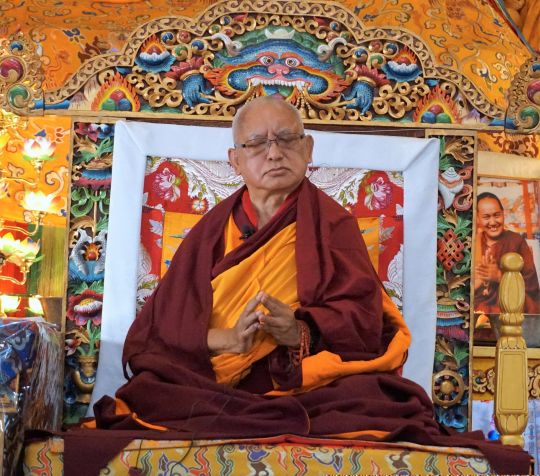
Lama Zopa Rinpoche preparing to give his first teaching at this year’s November course, Kopan Monastery, Nepal, November 26, 2016. Photo by Ven. Lobsang Sherab.
Lama Zopa Rinpoche was greeted with great excitement when he arrived at Kopan Monastery in Nepal in November. His first day of teaching there was November 26. “The teachings have been incredible,” reported Ven. Holly Ansett two days later. “Rinpoche has been teaching mainly on emptiness. His words have been extremely profound and moving, and have stimulated a lot of lively debate during group discussions.”
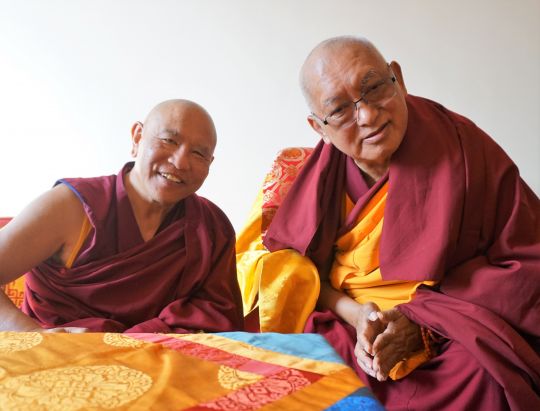
Lama Zopa Rinpoche meeting with Jhado Rinpoche, Kopan Monastery, November 2016. Photo by Ven. Lobsang Sherab.
In addition to teaching, Rinpoche has been meeting with various other luminaries of Tibetan Buddhism, including Rizong Rinpoche, recently retired from his position as the 102nd Ganden Tripa (spiritual head of Gelug tradition of Tibetan Buddhism); Khensur Jhado Tulku Rinpoche, former abbot of Namgyal Monastery in Dharamsala, the personal monastery of His Holiness the Dalai Lama; and the reincarnation of the beloved former abbot of Kopan, Khensur Rinpoche Lama Lhundrup. The young boy, Tenzin Rigsel Rinpoche, was recognized last May.
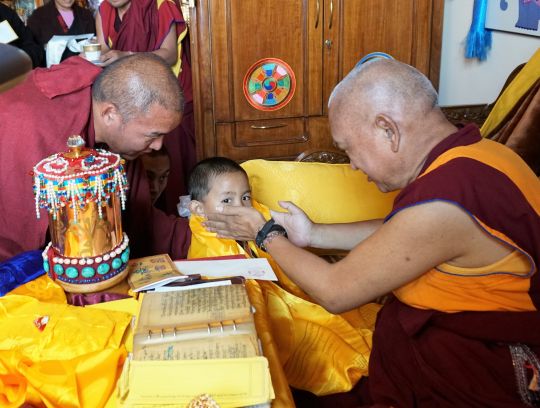
Lama Zopa Rinpoche meeting the reincarnation of Khensur Rinpoche Lama Lhundrup, Tenzin Rigsel, for the first time, Kopan Monastery, November 2016. Photo by Ven. Lobsang Sherab.
Rinpoche also gave an impromptu teaching on the benefits of the Namgyalma mantra one evening when he went out for a walk and met up with a number of the course participants—one of those unique and special happenings that take place amid the magic of Kopan!
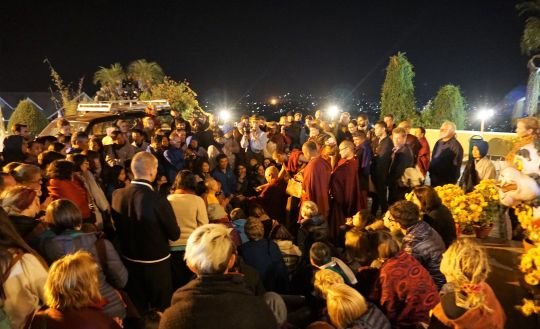
Going to the stupa one evening, Lama Zopa Rinpoche bumped into a few people and and gave an impromptu teaching, Kopan Monastery, November 2016. Photo by Ven. Lobsang Sherab.
Lama Zopa Rinpoche is the spiritual director of the Foundation for the Preservation of Mahayana Tradition (FPMT), a Tibetan Buddhist organization dedicated to the transmission of the Mahayana Buddhist tradition and values worldwide through teaching, meditation and community service.
30
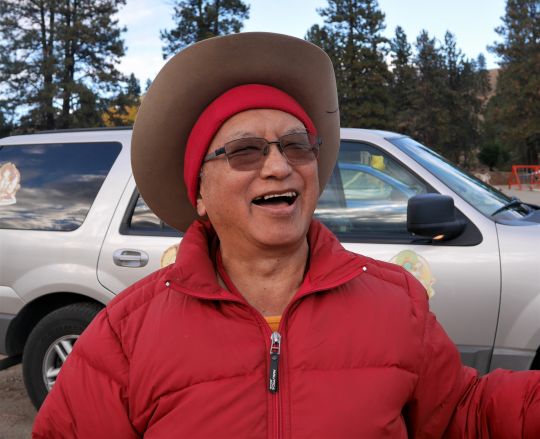
Lama Zopa Rinpoche preparing to go out on the water to bless Omak Lake, Washington, US, November 2016. Photo by Ven. Holly Ansett.
In the autumn of this year, Lama Zopa Rinpoche blessed several lakes located near Buddha Amitabha Pure Land (BAPL), in Washington State, USA. Omak Lake was one of them. Tremendously beautiful, it has stunning hills rising up behind its light blue water, and is a holy site for Native Americans.
Rinpoche asked for a raft in order to go out on the lakes, and blessed beings in a variety of ways, such as:
- Special flags that he designed for the raft. The flags have mantras written in Tibetan on one side, and on the other side, they have an explanation of their purpose. Several different mantras appear, including OM MANI PADME HUM and the mantra that blesses “just by seeing,” OM HANU PHASHA BHARA HE YE SVAHA. The mantras are blown out over the lake from the raft.
- On the top of the poles holding the flags Rinpoche put small wooden tops. Inside them are the long Namgyalma mantra and Ushnisha mantra. These turn and send mantras out into the world.
- Rinpoche had Namgyalma mantras printed on paper and laminated in plastic, so that the mantras float on the water, blessing all the beings below them. On one side of the paper is the Namgyalma mantra in Tibetan; this is placed face down in the water. The other side has a message explaining what the mantra is, so if people find the mantras floating or washed up, they don’t throw them away.
- Rinpoche has a mantra wheel that has millions of mantras on microfilm. Even just the shadow from this mantra wheel is said to bring benefits. Rinpoche held the mantra wheel over the lake as the boat moved along.
- Rinpoche has a Padmasambhava relic from Mount Kailash, in Tibet. This is inside a small stupa, which he held above the lake to bless the sentient beings in the water.
- While out on the lake, Rinpoche did extensive prayers, reciting them into a loudspeaker. Recordings of mantras were also played. The raft also had underwater speakers, so the fish and other lake beings could hear the mantras and prayers.
- Rinpoche oversaw the making of special blessed food that included crushed mani pills, tsampa, and water blessed by many mantras and also by a crystal with Padmasambhava mantras etched on it, so that all the sentient beings who ate the food would be blessed and purified.
- Rinpoche also blessed beings by placing the glass etched with Padmasambhava mantras at the side of the lake, where the water touches the mantras, but the mantras can’t be walked on or swum over by animals, which might create negative karma. This way the water gets blessed and then blesses the beings in it.
Watch Lama Zopa Rinpoche on YouTube as he chants blessings to the lake-bound beings from the raft:
https://youtu.be/o5UQMcj1H6k
Rinpoche asked the Sangha, in his absence, to keep going out on the lakes near BAPL on monthly blessing trips in order to continue to benefit all of the fish and other living beings. Despite the cold weather in Washington State, the Sangha have already been out on the water!
Lama Zopa Rinpoche is the spiritual director of the Foundation for the Preservation of Mahayana Tradition (FPMT), a Tibetan Buddhist organization dedicated to the transmission of the Mahayana Buddhist tradition and values worldwide through teaching, meditation and community service.
23
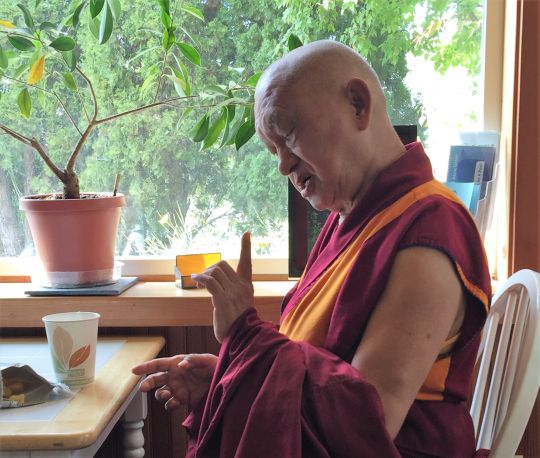
Lama Zopa Rinpoche gives an impromptu Dharma teaching in a coffee shop to two people who approached him, an act that demonstrated his stated wish to make every moment beneficial by teaching the Dharma, Washington State, US, November 2016. Photo by Ven. Roger Kunsang.
In 2007, Lama Zopa Rinpoche shared what he and some FPMT students did to benefit the millions of turkeys that are killed in the US for Thanksgiving Day. Rinpoche has long been a proponent of vegetarianism and thanks anyone who works to reduce the amount of meat they eat. Rinpoche suggests two practices that are beneficial for our friends the turkeys.
“I made a divination as to what would be the most beneficial thing to do for the turkeys and found that Medicine Buddha puja came out best… Another possibility could have been for us to do prostrations to the Thirty-five Buddhas, reciting these buddhas’ names with prostrations, to purify the negative karma of the turkeys and all other sentient beings, including the people who killed the turkeys, but in this case it came out better to do Medicine Buddha puja.” Read the full advice here …
Thanksgiving also means expressing gratitude, and gratitude is one of the 16 Guidelines for Life that Lama Zopa Rinpoche developed based on a 7th-century text from Tibetan king Songtsen Gampo. The king’s advice was, “Do not forget those who have been kind to you, and in return, do what benefits them according to your capacity.”
Read more about gratitude and the other human dharmas in The 16 Guidelines for Life, or get cards of the 16 Guidelines, both available from the Foundation Store.
Read more about FPMT’s activities to encourage vegetarianism on FPMT.org:
https://fpmt.org/tag/vegetarianism/
Read more about FPMT’s activities to benefit animals on FPMT.org:
https://fpmt.org/tag/animals/
Benefiting animals is one of Lama Zopa Rinpoche’s vast visions for FPMT:
https://fpmt.org/fpmt/vast-vision/#animals
Lama Zopa Rinpoche is the spiritual director of the Foundation for the Preservation of Mahayana Tradition (FPMT), a Tibetan Buddhist organization dedicated to the transmission of the Mahayana Buddhist tradition and values worldwide through teaching, meditation and community service.
- Tagged: 16 guidelines, animals, lama zopa rinpoche, thanksgiving, vegetarianism
- 0
21
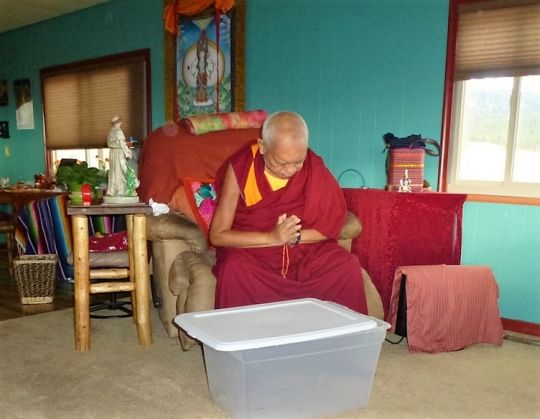
Lama Zopa Rinpoche says prayers at Buddha Amitabha Pure Land, Washington State, USA, November 2016.
Lama Zopa Rinpoche did extensive practices during November 2016 at Buddha Amitabha Pure Land to benefit animals—even one small snake who inadvertently ended up “in retreat” there!
“It says in Sutra Requested by [Lodro] Gyatso, ‘Even if they explained for eons, all the numberless past, present, and future buddhas could never finish explaining the benefits of generating bodhichitta and compassion for others, saving the lives of others, and practicing Dharma,’” commented Lama Zopa Rinpoche in 2007 in Taiwan. That teaching seemed particularly apt for those living at Buddha Amitabha Pure Land when they discovered a young snake struggling to escape after getting stuck to some adhesive left on the wall of a retreat cabin.

Jangsem struggles to free himself before his rescue.
Once Rinpoche and Sangha members had freed the unhappy sentient being—apparently a harmless gopher snake—with a combination of water and mantras, Rinpoche named him “Jangsem,” Tibetan for “bodhichitta.” Rinpoche also decided to keep Jangsem in his own house for a while in the hope of improving his future rebirths. Thus the small snake entered into retreat, in a large plastic box, comfortably resting on an old towel.
While Jamgsem inhabited the box, he had the chance to absorb countless prayers and mantras both spoken directly by Rinpoche and played to him from recordings. As well, resident Sangha spent significant time circumambulating with him to ensure he received extensive imprints from holy objects. After three weeks, Rinpoche indicated he could be released with special prayers that he not harm other living beings. While his towel was left outside for him in case he felt homesick and wanted to come back, Jangsem chose to return to the wild. He was accompanied by many prayers from Rinpoche and Sangha members, particularly that he would eventually find a precious human rebirth and a genuine Mahayana guru.
Watch “Rinpoche Recites Mantras for Jangsem the Snake” on YouTube:
https://www.youtube.com/watch?v=GcAo454riT0
Read more about FPMT’s activities to benefit animals on FPMT.org:
https://fpmt.org/tag/animals/.
Benefiting animals is one of Lama Zopa Rinpoche’s vast visions for FPMT:
https://fpmt.org/fpmt/vast-vision/#animals
Get Liberating Animals from the Danger of Death as an e-book or in a print copy from the Foundation Store and support FPMT International Office:
https://shop.fpmt.org/Liberating-Animals-eBook_p_2334.html.
Lama Zopa Rinpoche is the spiritual director of the Foundation for the Preservation of Mahayana Tradition (FPMT), a Tibetan Buddhist organization dedicated to the transmission of the Mahayana Buddhist tradition and values worldwide through teaching, meditation and community service.
- Tagged: animals, lama zopa rinpoche, mantras
- 0
14
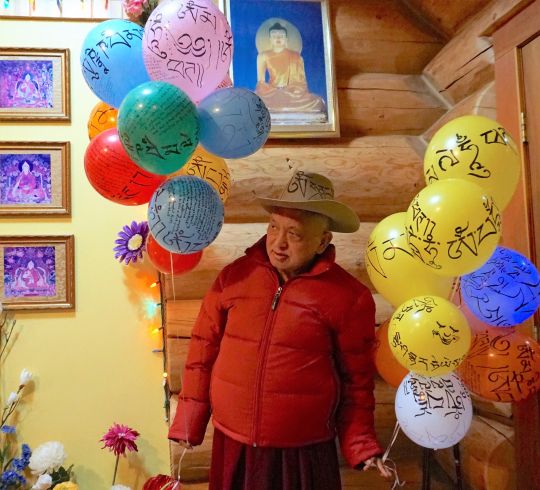
Lama Zopa Rinpoche with balloons and a hat that he has covered with mantras and prayers, Washington State, USA, November 2016. Photo by Ven. Lobsang Sherab.
Lama Zopa Rinpoche has been busy in recent weeks filling the world with mantras!
At Buddha Amitabha Pure Land in Washington State in the United States, in order to bless sentient beings on the land there and in the water nearby, Rinpoche has been wearing a mantra-covered hat; releasing balloons with mantras he has written on them; flying flags and banners covered with mantras; placing plastic-covered floating mantras in lakes; putting mantras on the roofs of bird feeders; holding microfilm containing multiple mantras above lakes and other places where creatures live; playing recordings of mantras; chanting mantras himself; and blessing the water in lakes and even a birdbath with a Padmasambhava mantra etched in glass.
The purpose of all these mantras? To bless and purify sentient beings, and ensure they have better futures. Rinpoche has explained in the past three ways of benefiting animals, fish, birds, and insects: taking them around holy objects while chanting mantras and prayers, blessing water they are in contact with, and chanting mantras loudly so they can hear them. Rinpoche and the Sangha have been doing all of these extensively at Buddha Amitabha Pure Land.
Read more about FPMT’s activities to benefit animals on FPMT.org:
https://fpmt.org/tag/animals/.
Benefiting animals is one of Lama Zopa Rinpoche’s vast visions for FPMT:
https://fpmt.org/fpmt/vast-vision/#animals
Get Liberating Animals from the Danger of Death as an e-book or in a print copy from the Foundation Store and support FPMT International Office:
https://shop.fpmt.org/Liberating-Animals-eBook_p_2334.html.
A mantra hat for students, designed by Lama Zopa Rinpoche, is available through the Foundation Store.
Lama Zopa Rinpoche is the spiritual director of the Foundation for the Preservation of Mahayana Tradition (FPMT), a Tibetan Buddhist organization dedicated to the transmission of the Mahayana Buddhist tradition and values worldwide through teaching, meditation and community service.
- Tagged: animals, lama zopa rinpoche, mantras
- 0
9
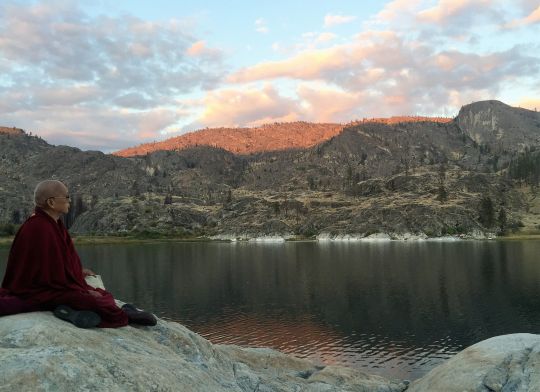
Lama Zopa Rinpoche blessing the sentient beings in Omak Lake, Washington State, USA, September 2016. Photo by Ven. Lobsang Sherab.
Rinpoche recently spent some time blessing Omak Lake, near Buddha Amitabha Pure Land in Washington State, USA. Rinpoche did extensive prayers and mantras for all the sentient beings in the lake now as well as those who will be there in future. Rinpoche had asked the Sangha earlier to make floating Namgyalma mantras: mantras written on paper and laminated with plastic so that they float above the living beings, blessing them.
Why bless a lake? In 2013, Lama Zopa Rinpoche explained that his goal when he blesses bodies of water is to “liberate all the animals and fish … to free them from the suffering of rebirth, old age, sickness and death, and to help them achieve total liberation from suffering and attain the state of omniscient mind, the peerless happiness!” According to Rinpoche in his book Liberating Animals from the Danger of Death, the living beings in the lake can experience purification of their karma and avoid the lower realms in the future. Rinpoche recounts the following story there:
“When the Buddha gave teachings to 500 swans in a field, in their next life they were born as human beings. They became monks and all became arya beings, able to achieve the cessation of suffering and the true path. So the result is unbelievable, just by hearing Dharma words. Vasubandhu (Lopön Yignyen) was reciting one text called the Abhidharmakosha and a pigeon on the roof heard this every day. When the pigeon died, Lopön Yignyen checked to see where the pigeon had been reborn. It was in a family who lived down below in the valley. He went down and saw the child … The child became a monk named Lopön Loden. He became an expert on the text which he had heard when he was a pigeon … Therefore, it’s extremely important to recite lam-rim prayers and mantras to animals.”
Read more about FPMT’s activities to benefit animals on FPMT.org:
https://fpmt.org/tag/animals/.
Benefiting animals is one of Lama Zopa Rinpoche’s vast visions for FPMT:
https://fpmt.org/fpmt/vast-vision/#animals
Get Liberating Animals from the Danger of Death as an e-book or in a print copy from the Foundation Store and support FPMT International Office:
https://shop.fpmt.org/Liberating-Animals-eBook_p_2334.html.
Lama Zopa Rinpoche is the spiritual director of the Foundation for the Preservation of Mahayana Tradition (FPMT), a Tibetan Buddhist organization dedicated to the transmission of the Mahayana Buddhist tradition and values worldwide through teaching, meditation and community service.
- Tagged: animals, lama zopa rinpoche, namgyalma mantra
- 0
7

Lama Zopa Rinpoche is sped to a teaching, New York City, USA, July 2016. Photo by Nan Meng.
“This is a very good meditation on emptiness,” says Lama Zopa Rinpoche in his book Kadampa Teachings, adding, “It’s simple but profound, and gives us a clear understanding.”
“When we hear or think of one year, ‘Oh, it takes one year to do that,’ whether it’s study or travel, it’s a real one year, one that exists from its own side. Now, when you analyze that one year, you find that it is labeled on the base, twelve months. ‘One year’ is imputed by your mind to the base, twelve months.
“So, what is one year? Twelve months. Twelve months is what is called ‘one year.’ When we think of the base, the twelve months, it’s not that one year becomes totally nonexistent. One year exists, but it exists in mere name, merely imputed by the mind. It’s not that it becomes totally nonexistent. It’s not that there’s no one year. There is one year, but it is something unbelievably subtle. What one year is is extremely subtle … The one year that you thought of at the beginning doesn’t exist. The real one year that you thought of without thinking of the twelve months, the real one year existing from its own side, is not there. It doesn’t exist. That one doesn’t exist at all, anywhere. It’s not on the tip of your nose, nor anywhere else. I’m joking. It exists nowhere. When you think of the base, the twelve months, your understanding of one year is something totally different from what appeared to you and what you believed before. It’s not that real one at all. The one year still exists. It’s not nonexistent; it exists, but it’s empty, empty of existing from its own side. It’s empty of the year that you first thought of, that first appeared to you and in which you believed. When you think of the twelve months, the one year exists but it’s now something totally different from what you thought before, from what appeared to you and what you believed before. It’s totally different. It exists but it’s empty. It exists but it’s unified with emptiness. So, this is the Middle Way….”
Read more from Kadampa Teachings on the Lama Yeshe Wisdom Archive:
https://www.lamayeshe.com/article/chapter/kadampa-teachings
Get the e-book or a print copy from the Foundation Store and support FPMT International Office:
https://shop.fpmt.org/Kadampa-Teachings–Hard-Copy_p_1283.html
Lama Zopa Rinpoche is the spiritual director of the Foundation for the Preservation of Mahayana Tradition (FPMT), a Tibetan Buddhist organization dedicated to the transmission of the Mahayana Buddhist tradition and values worldwide through teaching, meditation and community service.
- Tagged: kadampa teachings, lama zopa rinpoche
- 0
2
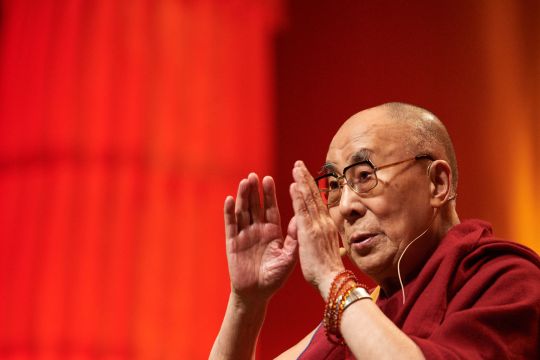
His Holiness the Dalai Lama teaching in Strasbourg, France, September 2016. Photo by Olivier Adam.
With organizational help from numerous FPMT volunteers, the city of Strasbourg, France, hosted His Holiness the Dalai Lama on September 17 and 18, 2016. His Holiness taught from Nagarjuna’s Commentary on Bodhichitta, conferred an Avalokiteshvara initiation, and gave a public talk entitled “Ethics Beyond Religion.” Lama Zopa Rinpoche has called offering service to His Holiness the Dalai Lama “the quickest and most vast way of benefiting sentient beings.” It is the first of Rinpoche’s vast visions for FPMT.
Ten Buddhist centers representing the four Tibetan Buddhist schools were involved in this visit by His Holiness, François Lecointre, director of Institut Vajra Yogini, reported, including three French FPMT centers: Institut Vajra Yogini, Nalanda Monastery, and Centre Kalachakra. He explained that in the early 1990s, at His Holiness’s behest, Buddhist centers in France created the Fédération du Bouddhisme Tibétain, so there is never just one center organizing a visit. “Whoever wants to join can,” said François. “It is a way to develop links and harmony among centers. And that FPMT centers help to organize teachings by His Holiness strengthens our link to him and preserves the lineage. Lama Zopa Rinpoche has said clearly many times that our number one priority as an organization is to serve His Holiness by all means possible. So it is great to be involved in organizing his events.”
FPMT volunteers were involved in reception, seating, security, ticketing, as well as other tasks. “The expertise of FPMT people in webcasts was also a great asset,” reported François, adding that “a record 1.2 million people listened to His Holiness’s public talk on the webcast. For each of the 8,000 people listening in the hall, 150 people were listening in their homes.” The multi-language webcast set-up had been tested earlier at the Light of the Path retreat with Lama Zopa Rinpoche in the US, he said.
Read more about His Holiness’s visit to Strasbourg in Mandala magazine’s latest online feature “Strasbourg, France Hosts His Holiness the Dalai Lama”:
https://fpmt.org/mandala/in-depth-stories/strasbourg-france-hosts-his-holiness-the-dalai-lama/
Additional details about the Strasbourg visit and webcasts of the teachings are available at www.dalailama-strasbourg2016.com and on the website of the Fédération du Bouddhisme Tibétain at http://www.fbt-asso.org.
Lama Zopa Rinpoche is the spiritual director of the Foundation for the Preservation of Mahayana Tradition (FPMT), a Tibetan Buddhist organization dedicated to the transmission of the Mahayana Buddhist tradition and values worldwide through teaching, meditation and community service.
- Tagged: fpmt europe, france, his holiness the dalai lama
- 0
31
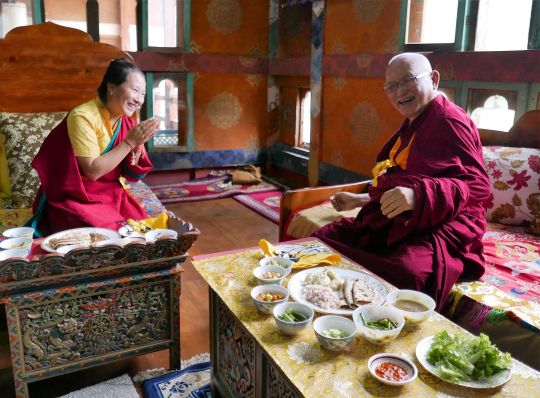
Lama Zopa Rinpoche enjoying lunch with Khandro-la in Bhutan, May 2016. Photo by Ven. Roger Kunsang.
“Discovering the suffering nature of samsara makes you very happy to restrain yourself from engaging in negative karma, in unrighteous actions,” declares Lama Zopa Rinpoche in his book Kadampa Teachings, adding, “The more you meditate, the more you discover that samsara and samsaric pleasures are only suffering in nature … Your wish to achieve liberation then becomes stronger.
“You then take vows, either lay vows such as the eight precepts or five lay vows or ordination as a monk or nun, with thirty-six or 253 vows. You are very happy to take vows, and you are also very happy to live in those vows. You don’t feel as if you living in a prison. The more analytical meditation you do, the more you discover the suffering nature of samsara and samsaric pleasures, especially the ones to which you are strongly attracted. The more you see that they are suffering, the more aversion to them you have and the stronger your wish to be free from them and achieve liberation. The very basic means to achieve liberation, to be free from this suffering, is by living in vows, either lay vows or the vows of a monk or nun. You are then very happy to do this, because you know that this is the path that protects you. This is your fundamental protection, protecting you from delusions, from negative karma and from all the sufferings of samsara. The stronger your thought to achieve liberation, the happier your mind is when you’re living in vows. It’s not that anybody is forcing you; it comes from your own heart. It’s as if you are suddenly being released after being in prison for a long time.”
Read more from Kadampa Teachings on the Lama Yeshe Wisdom Archive:
https://www.lamayeshe.com/article/chapter/kadampa-teachings
Get the e-book or a print copy from the Foundation Store and support FPMT International Office:
https://shop.fpmt.org/Kadampa-Teachings–Hard-Copy_p_1283.html
Lama Zopa Rinpoche is the spiritual director of the Foundation for the Preservation of Mahayana Tradition (FPMT), a Tibetan Buddhist organization dedicated to the transmission of the Mahayana Buddhist tradition and values worldwide through teaching, meditation and community service.
- Tagged: kadampa teachings, lama zopa rinpoche
- 0
26
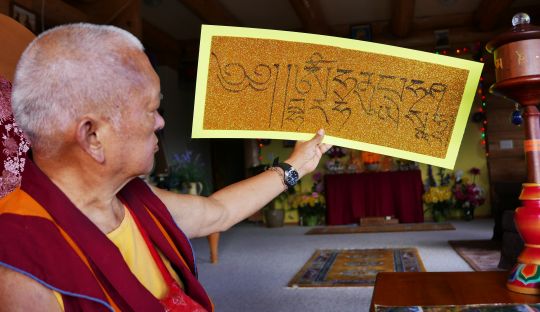
Lama Zopa Rinpoche examines the “Just by Seeing” mantra he has written out, Washington, USA, October 2016.
“Merely seeing this mantra purifies 100,000 eons of negative karma,” says Lama Zopa Rinpoche, adding, “This is said by Buddha in the sutra Pagpa Chu Lung Rolpai Do.”
Called the Pagpa Chu Lung Rolpai Do mantra or the “Just by Seeing” mantra, one is purified by merely seeing it in Tibetan says Lama Zopa Rinpoche, who in the above photo is holding up a copy he has recently written out himself while on retreat in Washington State.
The “Just by Seeing” mantra is spoken OM HANU PHASHA BHARA HE YE SVAHA and is reproduced again here in easier-to-read Tibetan:
Mantras, meaning “mind protection,” are Sanskrit syllables that are usually recited in conjunction with the practice of a particular meditational deity and embody the qualities of the deity with whom they are associated. They bring benefit to all who see, touch, hear, or speak them. Some mantras are so powerful that they are said to be able to benefit others even when no virtuous motivation is present.
The Just by Seeing / Pagpa Chu Lung Rolpai Do mantra is available on the FPMT.org mantras page.
This mantra is also found on the Precious Mantra Hat designed by Lama Zopa Rinpoche and available through the Foundation Store.
For advice from Lama Zopa Rinpoche about the benefits of particular mantras, or how to engage with mantras to eliminate or reduce obstacles, please visit FPMT.org for Advice from Lama Zopa Rinpoche and the Lama Yeshe Wisdom Archive for Lama Zopa Rinpoche’s Online Advice Book.
- Tagged: lama zopa rinpoche, mantras
- 0
24
“We are completely hallucinating,” Lama Zopa Rinpoche says in his latest book, Sun of Devotion, Stream of Blessings, newly available from Lama Yeshe Wisdom Archive in print and digital formats.
He continues: “This is the real situation we are faced with. It is a big mistake—the biggest mistake—that we make, to see things as existing from their own side, existing by themselves, as truly existing. To use ordinary language, things appear real to us, real from there. This ignorance is a hallucination; it decorates an object. I find this a very interesting way of describing it. This is how it happens. Past ignorance has left an imprint on the mind and that negative imprint decorates, projects, the hallucination, making the I appear as real. Whatever the object of the mind is—the I, the action, the object, form, sound, smell, taste, tangible object—the whole thing appears to us as real. There is a real car, a real road, a real sky, a real shop, real ice cream, real money … In the real gompa there are real flowers, real thangkas, real statues. Everything is real … We have no idea that it is only a hallucination …
“Everything is totally empty. It’s like a dream, like an illusion. If we are able to meditate this way, looking at all this like a dream, an illusion, a mirage—all the different examples—then it becomes very interesting. There is nothing to become attached to because it is not real.”
Read more from Sun of Devotion, Stream of Blessings on the Lama Yeshe Wisdom Archive:
https://www.lamayeshe.com/article/chapter/sun-devotion-stream-blessings
Get the book from the Foundation Store and support FPMT International Office:
https://shop.fpmt.org/Sun-of-Devotion-Stream-of-Blessings_p_2690.html
Lama Zopa Rinpoche is the spiritual director of the Foundation for the Preservation of Mahayana Tradition (FPMT), a Tibetan Buddhist organization dedicated to the transmission of the Mahayana Buddhist tradition and values worldwide through teaching, meditation and community service.
19
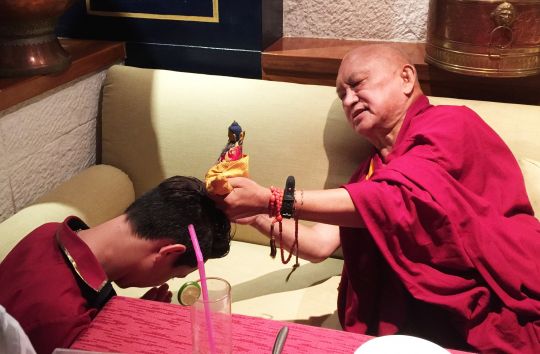
Lama Zopa Rinpoche blesses a waiter in a restaurant in Thailand, June 2016. Photo by Ven. Holly Ansett.
“Every single sentient being … is our wish-granting jewel,” Lama Zopa Rinpoche instructs in his latest book, Sun of Devotion, Stream of Blessings, newly available from Lama Yeshe Wisdom Archive in print and digital formats. He adds, “This is the purpose of our life, to live for them, for their happiness, to serve them.”
“Maybe you are working in an old folks’ home or something and you take care of one old person,” Rinpoche continues. “You should think … that you are so fortunate to be able to use your body, speech, and mind, your limbs, to serve this one sentient being. Remembering that all your past lives’ happiness, your present happiness and your future happiness all come from this person, you should see him or her as most kind, most precious, most dear. Then you serve that person in whatever way you can. If there is something you are unable to do, what to do? We are all limited in power, but whatever you are able to do, offer that service from your heart … offer your body, speech, and mind. That is the best Dharma, the best meditation. Then you will be happy. The more you appreciate how precious serving another being is, the more you enjoy it. It doesn’t have to be a guru you are serving. Your mind will be so happy to serve, whatever you can do. This applies to even the small things in your daily life: offering your seat to somebody on the bus, helping somebody carry a heavy load or, as my guru Kyabje Tsenshap Serkong Rinpoche often mentioned, rescuing a drowning insect. Try to do whatever you can to help, according to your capacity, whether it’s big or small.”
Read more from Sun of Devotion, Stream of Blessings on the Lama Yeshe Wisdom Archive:
https://www.lamayeshe.com/article/chapter/sun-devotion-stream-blessings
Get the book from the Foundation Store and support FPMT International Office:
https://shop.fpmt.org/Sun-of-Devotion-Stream-of-Blessings_p_2690.html
Lama Zopa Rinpoche is the spiritual director of the Foundation for the Preservation of Mahayana Tradition (FPMT), a Tibetan Buddhist organization dedicated to the transmission of the Mahayana Buddhist tradition and values worldwide through teaching, meditation and community service.
- Home
- News/Media
- Study & Practice
- About FPMT Education Services
- Latest News
- Programs
- New to Buddhism?
- Buddhist Mind Science: Activating Your Potential
- Heart Advice for Death and Dying
- Discovering Buddhism
- Living in the Path
- Exploring Buddhism
- FPMT Basic Program
- FPMT Masters Program
- FPMT In-Depth Meditation Training
- Maitripa College
- Lotsawa Rinchen Zangpo Translator Program
- Universal Education for Compassion & Wisdom
- Online Learning Center
- Prayers & Practice Materials
- Overview of Prayers & Practices
- Full Catalogue of Prayers & Practice Materials
- Explore Popular Topics
- Benefiting Animals
- Chenrezig Resources
- Death & Dying Resources
- Lama Chopa (Guru Puja)
- Lama Zopa Rinpoche: Compendium of Precious Instructions
- Lama Zopa Rinpoche: Life Practice Advice
- Lama Zopa Rinpoche Practice Series
- Lamrim Resources
- Mantras
- Prayer Book Updates
- Purification Practices
- Sutras
- Thought Transformation (Lojong)
- Audio Materials
- Dharma Dates – Tibetan Calendar
- Translation Services
- Publishing Services
- Teachings and Advice
- Find Teachings and Advice
- Lama Zopa Rinpoche Advice Page
- Lama Zopa Rinpoche: Compendium of Precious Instructions
- Lama Zopa Rinpoche Video Teachings
- ༧སྐྱབས་རྗེ་བཟོད་པ་རིན་པོ་ཆེ་མཆོག་ནས་སྩལ་བའི་བཀའ་སློབ་བརྙན་འཕྲིན།
- Podcasts
- Lama Yeshe Wisdom Archive
- Buddhism FAQ
- Dharma for Young People
- Resources on Holy Objects
- Ways to Offer Support
- Centers
- Affiliates Area
- Teachers
- Projects
- Charitable Projects
- Make a Donation
- Applying for Grants
- News about Projects
- Other Projects within FPMT
- Support International Office
- Projects Photo Galleries
- Give Where Most Needed
- FPMT
- Shop
Translate*
*powered by Google TranslateTranslation of pages on fpmt.org is performed by Google Translate, a third party service which FPMT has no control over. The service provides automated computer translations that are only an approximation of the websites' original content. The translations should not be considered exact and only used as a rough guide.Bad Education is like a prison. We must learn to open the prison, and psychologically liberate human beings.






